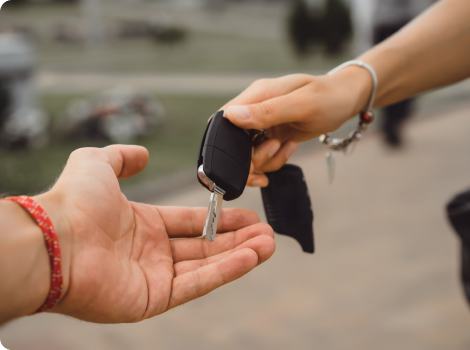A look into the future: Will Smartphones Be Replacing Car Keys?
Inventors have been entering the Shark Tank or Dragon’s Den for the last twenty years, all claiming to have solved the problem of lost car keys by using a smartphone app. And every time they were shot down by investors with this one question: What happens if your smartphone battery is flat?
It looks like Elon Musk has beaten them all to answer that question, because the new Tesla Model 3 is missing a traditional key ignition feature.
The Keyless Tesla Model 3
The Model 3 has many recognizable innovative features, such as a touchscreen instead of a traditional bells and whistles dashboard. But the fully electric car’s biggest difference from all its automotive predecessors is that it comes with no key fob. That little bit of black plastic that opens doors and starts engines has been replaced by a synergistic Tesla app for your smartphone.
How it works goes like this: the vehicle senses the authorized driver’s proximity when the smartphone is 30 feet / 10 meters away. The app acts like a virtual key and unlocks automatically, no hands required. The Model 3 engine starts when the car is shifted out of Park. The doors and trunk can be programmed to unlock individually or simultaneously. The doors lock as the driver walks away, also automatically.
As the motor industry seems happy to lag behind Tesla and allow it to do the innovation for them, it could be a few more years before they adopt virtual keys as standard. There are some basic issues for manufacturers of both smartphone apps and vehicles to overcome before they can roll out the technology to a wider audience. The two industries - smartphones and cars - need to work on updating the software to ensure there is no chance of security breaches or other glitches that might render the virtual car key app and the vehicle itself undrivable.
Does Smartphone as Car Key Work?
So far, testers haven’t found the smartphone app car key replacement to be as secure or as convenient as a traditional car key fob. This is because the technology is still in its infancy. What are the benefits of using a virtual car key to open your car doors and start the engine anyway?
- No key fob to lose
- No need to carry or wear a place to carry a key fob around
- No key fob replacement expenses when one or both key fobs have been lost
- You can effectively ‘lend’ your car to someone by granting them access to your app
But motoring and vehicle insurance experts are saying that the tech is jumping the gun, claiming care must be taken to ensure security and convenience are foolproof. So, the jury is still out on current virtual key tech’s limitations.
The Model 3 virtual key app depends on BLE (Bluetooth Low Energy) to be able to connect to the car. For this to work, the phone must be turned on with the app open and activated. The tech doesn’t work if the app is closed, which could be problematic for drivers with flat batteries in their smartphones. Testers said that the Tesla smartphone virtual key app functioned similarly to losing keys at the bottom of a large purse when the app was closed.
There are a few more disadvantages to using virtual keys:
- Dead battery
- Lost or stolen phone
- Parking attendants and valet parking needing permanent access to your smartphone
- Car wash services are not known for vetting their staff - so they can’t be trusted to look after a smartphone costing upward of $1,000
- Smartphones that are dropped in the toilet
- Smartphones that drop on the floor and crack the screen
Is the Tesla Keycard a Good Enough Backup?
Of course, Tesla has thought about all of those scenarios and come up with a solution: a backup keycard the driver can carry in their wallet or pocket. Not an ideal solution when half the premise driving the smartphone app is for everything to be activated by proximity, and not an item that has to be carried around all the time. Proximity activated door unlocking features have been around for over ten years, and is thus a well proven technology.
How the keycard locks or unlocks the car doors is by swiping it over an area of the driver’s seat. Because there is no push button start or ignition switch, the driver has to tap the keycard somewhere near the steering wheel to get the vehicle to start. Neither areas are marked; only the driver knows where they are. Refer back to parking attendants and valets services for the inconvenience of this feature!
The Disparity of the Built-in Obsolescence Between Smartphones and Cars
Without putting too fine a point on it, cars are built to last longer than smartphones. They are also more sturdy. This means that suppliers will have to work alongside smartphone manufacturers to make sure the virtual key tech remains compatible with every generation of smartphone development now and in the future.
Every single software and hardware upgrade must be developed in such a way that does not render the virtual key tech inoperable. With this much synergy expected to be flawlessly in place, it comes as no surprise that industries with virtual keys are recommending car owners continue to carry a spare / emergency key fob or keycard around with them.
Hackers
With so many threats to smart device users already out there, is it worth developing automotive technology that might fall prey to hackers? Signal jamming tech has the ability to stop car doors from automatically locking and start cars without a key - what’s stopping from hacking developing alongside virtual key tech?
There is good news: smartphone makers share developments in current security flaws and patch software updates to counteract them, but this might not be at a fast enough rate to stop the possibility of faulty or vulnerable hardware.
The Model 3 tech not only anticipates the driver’s proximity; it is incapable of recognizing if the driver is approaching to use the vehicle or simply walking by to fetch the post. One forgetful driver is all it takes for someone to gain access to the vehicle’s interior.
What is the Future of Virtual Keys?
When it comes to EV tech in general, you can be sure tech development teams know about the drawbacks of virtual keys and are working to fix the problems even as you are reading this.
Other auto industry manufacturers are getting in on the act, so you can be sure it’s not going away any time soon. It is likely that virtual keys will be developed to piggyback on alternate systems to be able to work every time. Car rental agencies are interested in the virtual key technology, much in the same way hotels changed to key cards on their booking systems.
Tesla has always had its finger on the pulse of what drivers need or haven’t even realized they need yet; as the technology spreads and catches on, other forms of starting and locking cars will date rapidly.
Only time will tell how fast the virtual key technology catches on, but there’s no way it’ll disappear now that it’s here.










